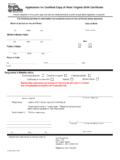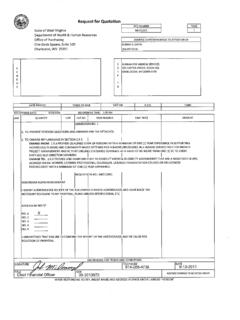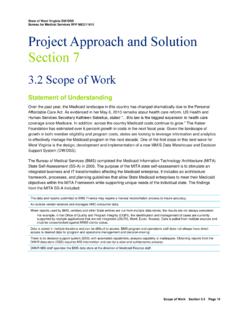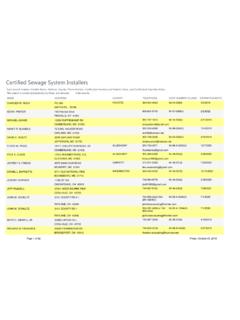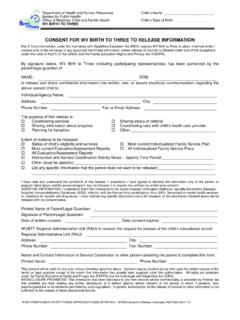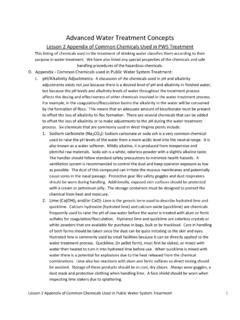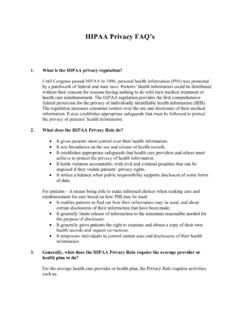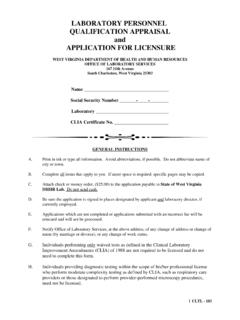Transcription of Directory-13 Reasonable Accommodations for Deaf …
1 Reasonable Accommodations for Deaf Employees Under the Americans with Disabilities Act Reprinted with permission from the National Association of the Deaf Law and Advocacy Center Title I of the Americans with Disabilities Act prohibits employers, employment agencies, labor unions and joint labor-management committees from discriminating against persons with disabilities. ADA obligations are placed on employers of fifteen or more people. Under Title I of the ADA, employers and other covered entities are required to make Reasonable accommodation to the physical or mental limitations of an employee: It is unlawful for a covered entity not to make Reasonable accommodation to the known physical or mental limitations of an otherwise qualified applicant or employee with a disability, unless such covered entity can demonstrate that the accommodation would impose an undue hardship on the operation of its business.
2 29 (a). A Reasonable accommodation is a modification or adjustment to a job, the work environment, or the way things are usually done to enable a qualified individual with a disability to have an equal employment opportunity. The ADA requires Reasonable accommodation : to ensure equal opportunity in the application process to enable an employee to perform an essential function of a job to allow an employee to enjoy equal benefits and privileges of employment. Reasonable Accommodations include telecommunication devices for the deaf (TTYs), amplified telephones, visual alarms, assistive listening systems, visible Accommodations to communicate audible alarms and messages, and, for deaf employees who rely on sign language, provision of qualified sign language interpreter services.
3 For some individuals and for some jobs, it may be necessary to have interpreter services available on a regular basis. For other employees or for job applicants, occasional interpreting on an as-needed basis may be sufficient. The ADA requires employers to make sure that deaf employees or job applicants can communicate effectively when necessary. This includes special occasions and meetings, training, job evaluations, and communication concerning work, discipline or job benefits. It also includes regular work-related communication and employee-sponsored benefits and programs. The ADA also requires Reasonable transfers of nonessential job duties. For example, a deaf individual would be qualified for a position with a small amount 13.
4 Of telephone responsibility, if these responsibilities could be transferred to another employee or handled with a TTY, a TTY relay system, or other accommodation such as e-mail. The regulation specifically lists these Accommodations : Job restructuring; part-time or modified work schedules; reassignment to a vacant position; acquisition or modifications of equipment or devices; appropriate adjustment or modifications of examinations, training materials, or policies; the provision of qualified readers or interpreters; and other similar Accommodations for individuals with disabilities. 29 (o)(2)(ii). Employers should consult with deaf and hard of hearing employees about the type of Accommodations that are needed in order to make its facilities and work environment accessible.
5 The accommodation that is appropriate for one deaf or hard of hearing employee may not be successful in achieving effective communication for other employees. The duty to provide interpreters and to make other Reasonable Accommodations is not limited to daily work performance activities or the ability to perform the essential functions of a job. Applicants are entitled to Reasonable Accommodations during the interview and application process. Employees are entitled to equal access to general information, employee benefits and training opportunities available to other employees. Employees should be able to have access to telephone services, recreational and social activities, emergency procedures, health programs, and the whole range of facilities, services and amenities that are available to other employees.
6 Modifications or adjustments may be required in the work environment, in the manner or circumstances in which a job is customarily performed, and in employment policies. Examples of Reasonable accommodation include: provision of interpreters or transcribers for meetings and for conferences with supervisors or co-workers, for general safety or employment meetings, for health programs, for training (both on-site and off-site). establishing policies and procedures for procuring necessary interpreter or transcription services TTYs, amplified telephones, and/or flashing ringers for work-related telephone duties and for personal use during lunch and break periods installation of flashing lights on smoke alarms and on equipment installation of assistive listening systems in auditoriums and meeting rooms to benefit workers who use hearing aids or other amplification devices installation of barriers or muffling to control ambient noise levels installation of televisions equipped with decoding capability, to display closed captions on televised or videotaped information shown to employees 14.
7 Permission to bring trained hearing assistance dogs into the workplace modification of intercom entry systems to permit deaf people to enter secured building entrances See EEOC Technical Assistance Manual on the Employment Provisions of the Americans with Disabilities Act, III-32, 33. Employers may deduct the cost of Accommodations , and may be eligible for special tax credits to assist in the provision of Reasonable Accommodations . Failure to provide necessary Accommodations may subject an employer to liability. Complaints of discrimination based on failure to provide Reasonable Accommodations should be filed with the Equal Employment Opportunity Commission (EEOC). For more information, visit The National Association of the Deaf (NAD) Law and Advocacy Center prepared this material as informal guidance.
8 This is not legal advice. The NAD assumes no liability for this material. For additional information or technical assistance about how laws against disability discrimination apply to you, contact the NAD Law and Advocacy Center, 301-587-7730 (Voice/TTY), 301-587-0234 (FAX), a local attorney (for more information, see Get a Lawyer); or an enforcement agency, see list at or call 800-514-0301 (Voice) or 800-514-0383 (TTY). 15.
